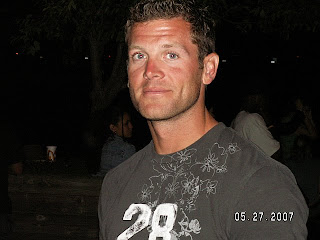A few years back I had the opportunity to hear a Desert Storm veteran talk about morality. Kind of strange to hear someone who had actually killed people speak on the topic, but the story he shared presented a very important distinction between two types of morals - relative and absolute.
A small group of he and his fellow soldiers were advancing on an enemy front in the Iraqi desert. The enemy had secured some sort of base and was unaware of the advancing American unit. They moved meticulously to avoid being discovered by the Iraqis, and after several hours were within site of the enemy force. The surprise attack was immanent, as well were the deaths of many enemy soldiers.
However, as careful as they were to advance unnoticed, a small Iraqi boy inadvertently stumbled upon the platoon, presenting the Americans with a significant moral dilemma. Would they let the boy go, knowing he would return to his countrymen and alert them of the attack? Or would they kill him, prevent his message from reaching the enemy and preserve their element of surprise?
It is here that the distinction between relative and absolute morality guided their decision. Human casualties are part of war, and is something that every soldier has to come to terms with at some point. During times of war, relatively speaking, certain human casualties are acceptible. However, knowingly killing a young, innocent child becomes an issue of absolute morality, an act that under no circumstances is acceptable.
As the story goes, the platoon allowed the child to go, began their attack early, and eventually succeeded in their original mission by defeating the enemy force. In a world of absolute morality, they had done right.
As a coach, I'm fortunate not to have to make life or death decisions in the literal sense, but I've learned that the ideas of relative vs. absolute still ring true when it comes to success.
When I first began coaching in 2002, the team I inherited was horrible. Generally speaking, it takes about 200 points to win a conference championship meet, and in a conference of 8 teams, we had placed dead last for several years and were lucky to score 5. In my first year as head coach, we followed suit by doing just that, finishing last and scoring in the single digits. It might seem that with such an abysmal performance there was no success, and in part that was true. In absolute terms, the team was not successful. However, looking at a few individual performances, it was apparent that some success was achieved...relatively speaking. Several athletes had performed at higher levels than they had before, jumping further or running faster. At competitions where previous teams had quit, we competed hard until the final race was over. All the while, our competitive spirit was noticed by other teams, and ultimately more talented athletes were interested in becoming part of our program.
The next season was a little better. We moved up to a 5th place conference finish, and we even had an athlete qualify to compete at the National Championship meet. After this season that I convinced the team that if we recognized relative success and worked to perform better than we had in the past, that eventually our success would be absolute. The team bought in, and it worked.
Fast forward to three years later, and we came home from the National Championship meet having placed 7th. In a few short years, we had gone from conference bottom dwellers to a national powerhouse, absolute success.
I was reminded of this philosophy again today with an athlete that I currently coach. After the weight throw competition, I noticed that an athlete was being particularly hard on herself and I wanted to help her reflect positively on her experience. Given that she has just started to learn the implement this year, and is still struggling with some fundamental techniques, frustration is inevitable. When I asked her what specifically she was so frustrated about, she shared she was upset she hadn't won. I was taken aback. Here is an athlete who struggles with basic movements, is in the beginning stages of learning the event, and is upset that she can't beat people who have been honing their skills for many years. It had never occurred to me that she defined success so singularly, and winning was her only barometer.
So I shared with her the story of the previous team and the idea of relative and absolute success. She needed to understand that today success might be measured by throwing a few centimeters further than she had yesterday, and tomorrow throwing a little further than today. I explained that she must be happy with this relative success, and with enough of it, someday her success would be absolute. Some day, she would be winning competitions. All this time she had been striving for the top rung of the ladder before she had barely climbed onto the first.
Success rarely comes by windfall and is rarely absolute. If we measure ourselves against the best in the world without understanding the years of hard work and dedication they took to get there, we will be set up for failure. By looking at success relatively, we see each rung of the ladder, and can strive every day to reach higher and higher. Eventually, we will be the best in the "world", however we decide to define it.
Subscribe to:
Post Comments (Atom)

No comments:
Post a Comment